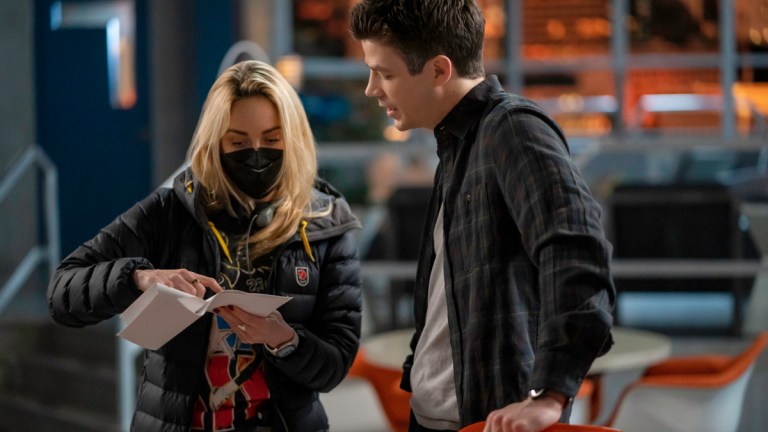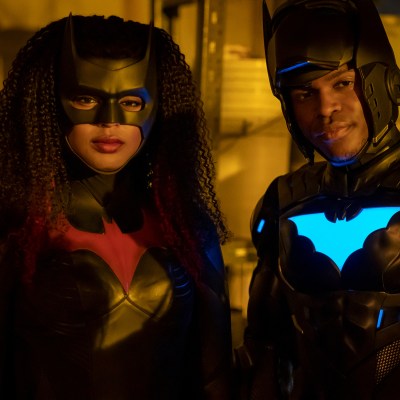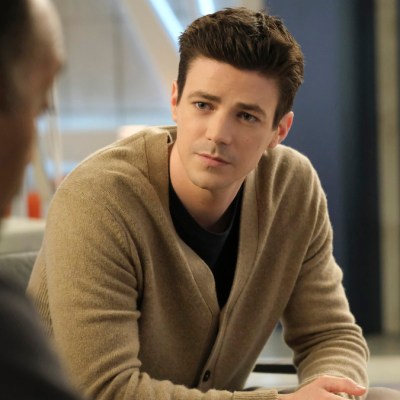The Flash: Caity Lotz Takes Us Behind the Scenes of “The Curious Case of Bartholomew Allen”
Legends of Tomorrow star Caity Lotz tells us about directing one of The Flash’s most surprisingly moving episodes yet.

The following contains The Flash spoilers.
The Flash Season 8 Episode 16
The Flash’s “The Curious Case of Bartholomew Allen” is another of what showrunner Eric Wallace likes to refer to as an “interlude” episode, an hour that isn’t as clearly connected to the larger ongoing arcs of the season (also known as “graphic novels”). As a result, while there are a few small references to season 8’s’ larger stories—Iris is still missing and the episode ends with Barry destroying the mad scientist lab that Caitlin built in her living room after Frost’s death—it generally feels as though it’s a story that could essentially take place at any point in the season.
In fact, there’s a lot about this installment, which revolves around the Flash getting hit with a shockwave that causes him to age rapidly and his powers to deteriorate further each time he uses them, which has a distinctly season one flavor to it. Largely because it strikes an almost perfect balance of humor and heart, mixing physical comedy with genuinely moving emotion. But that may well also be due to the influence of the special guest star behind the scenes.
Though it’s been about a month since Legends of Tomorrow was officially canceled, former leading lady Caity Lotz still made one last crossover this year. But instead of starring onscreen, she took charge behind the camera. “The Curious Case of Bartholomew Allen” isn’t Lotz’s first time in the director’s chair; the actress helmed three episodes of Legends—season 5’s “Mortal Khanbat,” season 6’s “The Satanist’s Apprentice,” and season 7’s “wvrdr_error_100 not found,” the series’ 100th episode. But it does mark her directorial debut on a show that was not her own
“It was definitely different,” Lotz tells Den of Geek when asked about directing a show she wasn’t also starring on. “It was interesting because I knew a lot of the actors, but I didn’t really know the crew or anybody. So it was [challenging] trying to get to know everybody and have everyone get to know you in such a short period of time. But it was also kind of a nice change to not have, like, ten people in a scene!”
According to Lotz, the episode is more of a “standalone” than a lot of installments in The Flash universe, which she says offers a “little more freedom” for her as a director.
“You have a lot more limitations when you have an episode that [is part of a larger arc] — and that was something I talked to Eric about in terms of, you know, following beats, because if [he] wrote it in the script, it’s really important. There’s a lot of interconnected stuff and the more interconnected it is, the more you have to make sure that you’re playing your part and being the puzzle piece that you need to be.”
But, just because this episode isn’t as tightly tied into season 8’s overall arc as other installments we’ve seen recently, that doesn’t mean that it doesn’t have something important to say. “The Curious Case of Bartholomew Allen” actually turns out to be a surprisingly emotional hour, wrestling with big existential questions about aging, purpose and making the most of the time that’s been given to you, all mixed with a healthy dose of The Flash’s heartfelt humor.
“It’s really [about] finding the universal truth in everything,” Lotz says when asked about her approach to depicting such big themes onscreen. “So that, when people watch it, [they] say ‘Oh, I feel that. I understand that. I know that.’ My dad had just recently retired, so I felt like in talking to him about that stuff it really played into Jesse Martin’s storyline.”
Though Lotz has worked with many of the major cast members on The Flash before, she was effusive in her praise of their performances and their work ethic from the other side of the camera.
“Grant [Gustin] always just brings heart into all his work,” Lotz says. “And he’s so good with all the physical comedy. But everyone was just really sweet. I think they wanted to make sure I had a good time and a good experience on their set. Of course, I wanted to do a bunch of complicated things that required very specific movements from the actors. But everyone was super game to make it work. it wasn’t like I have to do it this way with my thing. It was like everyone wanted to be in service of the greater story.”
Despite its emotionally heavy subject matter, Lotz’s outing is also one of the funniest The Flash installments in recent memory, from the physical humor of Barry’s rapidly deteriorating physique (oh no gray hairs!) to our first glimpse of Team Flash group game night.
But though it may not appear to be the case (the cast does often make it look fairly effortless), Lotz, says that shooting comedy is more difficult than you might expect.
“You know, I think comedy is harder than drama. Because to me, drama is just like truth,” Lotz explains. “I don’t have to decide how to play it with drama. Whereas in comedy, you want to make sure you hit the beats and there’s a rhythm and there’s timing and it’s a bit more technical. So I do think it can be more challenging, but with this stuff— I mean, the script was funny and the beats were there. It’s all about committing.”
While it’s evident that Team Flash fully committed to Dungeons and Dragons night—a sequence that may well go down in history as one of the show’s most entertaining moments (even if I do weep for the version of this game where both Iris and Caitlin were present)—Lotz says she’s never played herself.
“Yeah, actually, no, I have not,” she laughs. “But I had a lot of, you know, resident nerds [on set] that I could ask for help and advice on what was realistic and what wasn’t. And I was like—I need to play this game! This seems fun.”
Now that her time on the Waverider has come to a close—and Legends “had a good run,” she says—Lotz is looking forward to doing more directing work in the future, in addition to performing in front of the camera.
“I really would like to do a feature,” she says. “Because I want to world build. I want to create my own visual language for something and a lot of TV is you’ve got to fit what’s there. Your job is to come in and execute in their style and I’d like to create [something] from scratch, from getting to flex all those creative muscles and kind of explore.”


